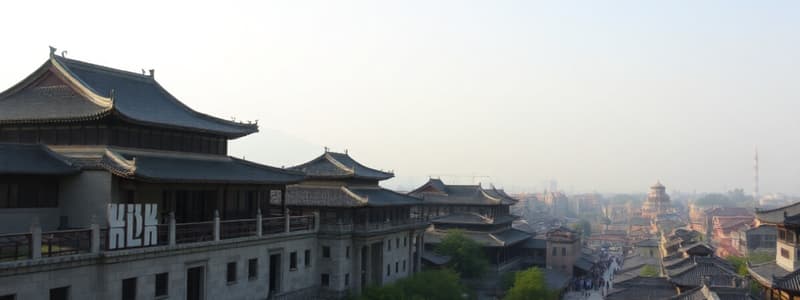Podcast
Questions and Answers
What was the general perception of shopkeepers in China, Korea, and Japan?
What was the general perception of shopkeepers in China, Korea, and Japan?
- They were recognized as cultural ambassadors.
- They were highly respected for their role in trade.
- They were not well perceived and banned from official positions. (correct)
- They were viewed as essential contributors to the economy.
What motivated the establishment of trade along the Silk Roads?
What motivated the establishment of trade along the Silk Roads?
- Security and goodwill cooperation through gifts. (correct)
- Demand for agricultural products.
- The need for religious expansion.
- Competition among local merchants.
Which city is noted for its strategic and logistical importance in the Silk Road network?
Which city is noted for its strategic and logistical importance in the Silk Road network?
- Chang'an
- Dunhuang (correct)
- Gansu
- Ordos
What was discovered in the Library Cave in Dunhuang?
What was discovered in the Library Cave in Dunhuang?
Which of the following factors contributed to the silk trade from Central and Western Asia?
Which of the following factors contributed to the silk trade from Central and Western Asia?
The manuscripts found in the Library Cave were written in which of the following languages?
The manuscripts found in the Library Cave were written in which of the following languages?
What was the primary role of Sogdians in relation to the Silk Road?
What was the primary role of Sogdians in relation to the Silk Road?
What did merchants encounter when they arrived in China from the west?
What did merchants encounter when they arrived in China from the west?
What was considered to be an ill-fating presage regarding the location of the Imperial Palace in Luoyang?
What was considered to be an ill-fating presage regarding the location of the Imperial Palace in Luoyang?
Which shape was considered ideal for a city in Chinese tradition?
Which shape was considered ideal for a city in Chinese tradition?
What was a primary reason for the Han dynasty's efforts to establish alliances with nomadic tribes during the 2nd century BCE?
What was a primary reason for the Han dynasty's efforts to establish alliances with nomadic tribes during the 2nd century BCE?
Which commodities were commonly traded along the Steppe Route before the Silk Road was formally opened?
Which commodities were commonly traded along the Steppe Route before the Silk Road was formally opened?
What misconception might one have about the Han dynasty's trade intentions?
What misconception might one have about the Han dynasty's trade intentions?
What characterized the layout of the city of Luoyang compared to traditional beliefs?
What characterized the layout of the city of Luoyang compared to traditional beliefs?
What type of artifacts were commonly found along the Steppe Route?
What type of artifacts were commonly found along the Steppe Route?
What was the perception of merchants during the era of the Silk Roads?
What was the perception of merchants during the era of the Silk Roads?
Flashcards are hidden until you start studying
Study Notes
Luoyang
- Luoyang, in the Yellow River Valley, was an ancient Chinese capital city.
- Unlike the ideal Chinese city, Luoyang was rectangular, had 14 gates, and its Imperial Palace was in the north.
- Luoyang was a prosperous city.
- It was the capital during the Eastern Han dynasty from 25 to 220.
- It was the capital of the Northern Wei dynasty (386 to 534).
- It was considered a center of trade and culture.
The Yellow River Valley
- The Yellow River Valley during the Silk Roads era was attractive due to its political, not just economic, significance.
- The valley was seen as a strategic location for controlling trade routes and establishing alliances.
Origins of the Silk Road
- The Silk Road was not a single, formalized route but a network of interconnected routes.
- Before Zhang Qian, the "Silk Road," there was an informal system of contact and exchange across Eurasia.
- The Steppe Route was used for trade long before the Silk Road. It ran through the Northern steppes of Central Eurasia.
- The Silk Road was not solely about trade. The main goal of the Han dynasty was security, and then trade.
- Merchants were not highly respected in China.
- They were banned from official positions and owning land.
- Trade was heavily taxed.
- Chinese first focused on sending tributes and diplomacy to other nations, establishing good relationships.
- Gifts and tribute, including silk, fostered a market in Central and Western Asia for Chinese goods, leading to production.
- The Sogdians (a people from Central Asia) were interested in controlling and profiting from the Silk Road network.
Dunhuang
- Situated in northwest China, Dunhuang is a UNESCO World Heritage Site and a strategically important location on the Silk Road.
- The city was an oasis, making it a vital stopping point for merchants travelling along the Silk Road.
- The Silk Road from Chang'an branched into two routes in Dunhuang.
- The city became a center for caravans and merchants.
Mogao Caves
- The Mogao Caves were built around the 4th century.
- They were built as Buddhist temples.
- They contain numerous murals, sculptures, and other artifacts.
- The caves were expanded over centuries making them a major site for Buddhist art and culture.
The Library Cave
- The Library Cave at Dunhuang was discovered in 1900.
- It contained over 50,000 manuscripts from the 4th to the 11th centuries.
- The manuscripts include religious texts, art, and writings in multiple languages (including Sanskrit, Tibetan, Chinese, Sogdian, Uyghur, Khotanese, Hebrew).
- These manuscripts offer valuable insights into Silk Road cultural exchange and history.
Studying That Suits You
Use AI to generate personalized quizzes and flashcards to suit your learning preferences.

